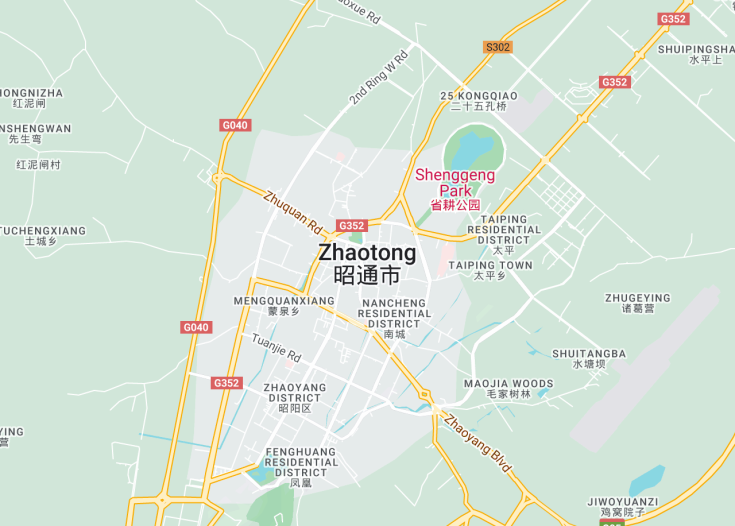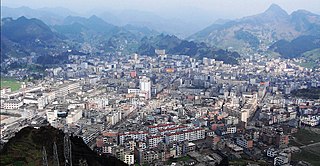Zhaotong, located in the northeastern part of Yunnan province, China, serves as a captivating gateway to the enchanting landscapes of the region. Known for its rich cultural heritage and breathtaking natural scenery, Zhaotong offers an array of experiences for travelers. From exploring ancient villages to hiking through verdant mountains and visiting serene lakes, the city is a treasure trove of historical and ecological wonders, making it an ideal destination for adventurers and culture enthusiasts alike.
When in Zhaotong, make sure to visit Dashanbao Black-necked Crane Reserve, a prime spot for nature lovers and bird watchers.
Plan your journey around the Lunar Chinese New Year to experience Zhaotong’s vibrant local festivals and traditions firsthand.
How to best experience Zhaotong?
Search for Tickets, tours, and activities in Zhaotong using direct search on the following providers:
GetYourGuide.com Viator.com Trip.com Expedia.com Tiqets.com Ctrip.com (中文)
Zhaotong: Gateway to the Wumeng Mountains
| Country | China |
| Time in Zhaotong | GMT+8 |
| Language spoken | Mandarin |
| Population | 5.8 million (Source: Latest Census) |
| Currency | Chinese Yuan (¥ / CNY) |
| Airports | Zhaotong Airport (3 mi / 5 km) |
Zhaotong, positioned in the northeastern part of Yunnan Province in China, serves as a crucial junction for cultural exchange and economic activities between the provinces of Yunnan, Sichuan, and Guizhou. The region is predominantly mountainous, providing a natural fortress that has historically protected its residents while also isolating them. Due to this, Zhaotong has developed a unique cultural identity distinct from its neighboring areas.
With a history that dates back to the Han Dynasty, Zhaotong has been an important strategic location. Its significance rose during various dynastic eras as a trade and military outpost. The city is surrounded by the towering Wumeng and Dashan mountains which are not only a source of breathtaking natural beauty but also rich in biodiversity, making it a haven for environmentalists and nature lovers.
The economy of Zhaotong has traditionally been based on agriculture, with the major crops being rice, maize, and tobacco. However, in recent years, there has been a push towards industrial development and tourism. The local government has invested in infrastructure improvements, making the city more accessible and encouraging tourism, which is slowly becoming a significant part of the economy.
Zhaotong is also known for its educational contributions, housing several institutions that are pivotal in advancing rural education in China. Furthermore, its cultural landscape is vibrant with various ethnic minorities such as the Miao, Yi, and Hui, each adding to the rich tapestry of customs and traditions that can be witnessed during local festivals and in everyday life.
Despite modern advancements, Zhaotong retains much of its rustic charm with many parts of the city still adorned with traditional wooden houses and cobblestone streets, providing a glimpse into China’s rich historical past. Its remote and picturesque landscapes offer an escape from the bustling city life and open up opportunities for various outdoor activities including hiking, bird-watching, and exploring historical sites.
Where is Zhaotong?
Zhaotong is located in the northeastern Yunnan Province, China, nestled within the Wumeng Mountain range.
Distances:
| Route | Distance by car | Time by car |
| Kunming to Zhaotong | 207 miles (333 km) | Approximately 5 hours |
| Chengdu to Zhaotong | 328 miles (528 km) | Approximately 7 hours |
What is Zhaotong famous for?
Zhaotong is renowned for its stunning natural landscapes, particularly the Wumeng Mountains, which offer remarkable scenic beauty and a rich biodiversity that attracts nature enthusiasts and researchers alike.
History
Prehistoric Period – Ancient Times
Zhaotong, with its rich historical tapestry, traces its origins back to prehistoric times when early humans settled in the region, evidenced by archaeological findings. These initial inhabitants capitalized on the fertile lands and abundant resources, setting the foundation for future developments.
221 BC – Early Dynastic Influence
The area officially entered recorded history during the Qin Dynasty when it became a strategic point on the southern Silk Road. As dynasties rose and fell, Zhaotong became a vital military and trading outpost, influencing the cultural and economic frameworks of the region.
960-1279 AD – The Song Dynasty Flourishing
During the Song Dynasty, Zhaotong experienced significant growth. The establishment of imperial posts and expansion of trade routes helped stimulate local economy and culture. This era also saw the construction of many temples and schools, laying the intellectual and spiritual groundwork that characterizes the region today.
Modern Era – 20th Century Onwards
The 20th century was a transformative period for Zhaotong as it navigated through the complexities of modern China, including the Chinese Civil War and the Cultural Revolution. The city also faced natural challenges, such as earthquakes, but its resilient spirit ensured recovery and growth. Today, Zhaotong is recognized as an important urban center in northeastern Yunnan, striving towards modernization while preserving its rich heritage.
Visit Zhaotong
What to see and do in Zhaotong, China
Zhaotong offers a unique blend of cultural and natural attractions. Visitors should explore:
- The ancient town of Shuifu, which provides a glimpse into traditional architectural styles and local customs.
- Zhaotong City Museum, housing artefacts and exhibits that narrate the region’s rich history.
- The scenic Dashanbao Black-necked Crane National Nature Reserve, ideal for bird watching and enjoying tranquil natural beauty.
Festivals & Celebrations in Zhaotong
Zhaotong hosts several cultural events throughout the year:
- The Spring Festival, celebrating Chinese New Year, features vibrant parades and family reunions.
- The Harvest Festival in autumn honors the agricultural roots of the region with music, dance, and traditional foods.
These events are deeply rooted in the local traditions and offer a wonderful opportunity for visitors to experience genuine Chinese culture.
Best time to visit Zhaotong
The best time to visit Zhaotong is during spring (March to May) and autumn (September to November). During these periods, the weather is pleasant, and the scenic beauty of the region is at its peak, making outdoor activities and exploration particularly enjoyable.
Is Zhaotong worth visiting?
Zhaotong offers a compelling mix of historical depth, cultural richness, and natural beauty, making it a worthy destination for those interested in exploring off-the-beaten-path locations in China. However, it may not cater as well to those seeking luxury accommodations or a vibrant nightlife. The region’s strengths lie in its educational museums, traditional festivities, and stunning natural reserves. Overall, Zhaotong is recommended for travelers who appreciate cultural immersion and natural landscapes, but those needing more cosmopolitan amenities might find it lacking.

